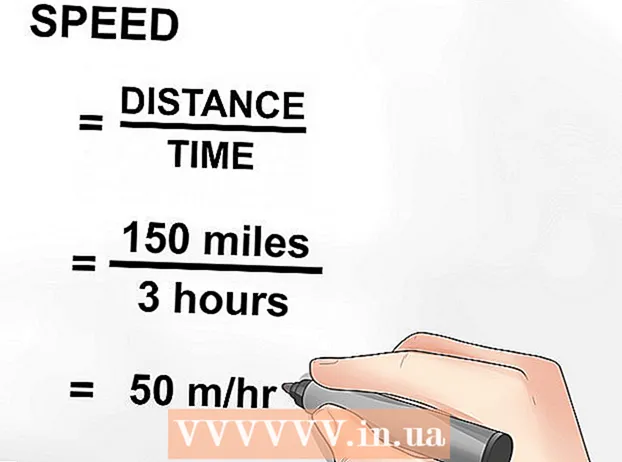Author:
Mark Sanchez
Date Of Creation:
6 January 2021
Update Date:
1 July 2024

Content
- Steps
- Method 1 of 5: Indicative Mood (Indicativo)
- Method 2 of 5: Subjuntivo
- Method 3 of 5: Imperativo Afirmativo
- Method 4 of 5: Perfecto
- Method 5 of 5: Completed Subjunctive Tense (Perfecto de Subjuntivo)
The Spanish verb “hacer” means to do, to make or to create. Unlike most Spanish verbs, hacer is an irregular verb, so it does not always follow the same conjugation rules that apply to verbs with the ending - er, in this article you will learn how to conjugate the verb correctly in different tenses.
Steps
Method 1 of 5: Indicative Mood (Indicativo)
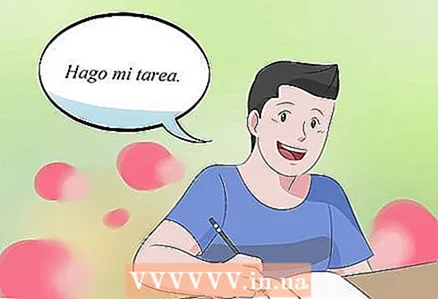 1 Conjugation of a verb in the present tense (Presente de indicativo) This is the simplest tense that is used to describe what is happening at the moment.
1 Conjugation of a verb in the present tense (Presente de indicativo) This is the simplest tense that is used to describe what is happening at the moment.- Example: Hago mi tarea. "I'm doing homework."
- yo: hago
- tú: haces
- él / ella / usted: hace
- nosotros / -as: hacemos
- vosotros / -as: hacéis
- ellos / ellas / ustedes: hacen
 2 Conjugation of hacer in the indicative of the past completed tense. (Preterito de indicativo). Use this time to describe specific actions that have taken place in the past and that have been completed so far.
2 Conjugation of hacer in the indicative of the past completed tense. (Preterito de indicativo). Use this time to describe specific actions that have taken place in the past and that have been completed so far. - Example: Maria hizo su tarea. "Maria has done her homework."
- yo: hice
- tú: hiciste
- él / ella / usted: hizo
- nosotros / -as: hicimos
- vosotros / -as: hicisteis
- ellos / ellas / ustedes: hicieron
 3 Conjugation of the verb in the indicative mood of the past incomplete tense. The past tense of the indicative mood of the unfinished tense (Imperfecto de Indicativo) should be used to describe a specific action that was done in the past, but is still not completed and it is not yet clear whether it can be continued in the present.
3 Conjugation of the verb in the indicative mood of the past incomplete tense. The past tense of the indicative mood of the unfinished tense (Imperfecto de Indicativo) should be used to describe a specific action that was done in the past, but is still not completed and it is not yet clear whether it can be continued in the present. - Example: Hacía mi tarea. “I did my homework”
- yo: hacía
- tú: hacías
- él / ella / usted: hacía
- nosotros / -as: hacíamos
- vosotros / -as: hacíais
- ellos / ellas / ustedes: hacían
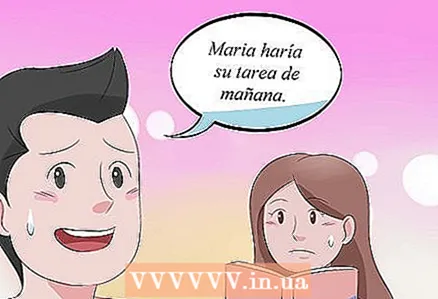 4 Conjugation of the verb hacer in the future indicative tense. The future indicative tense (Futuro indicativo) is used when it comes to an action that will certainly be done in the future.
4 Conjugation of the verb hacer in the future indicative tense. The future indicative tense (Futuro indicativo) is used when it comes to an action that will certainly be done in the future. - Example: "Maria haría su tarea de mañana." "Maria will do her homework tomorrow."
- yo: haría
- tú: harías
- él / ella / usted: haría
- nosotros / -as: haríamos
- vosotros / -as: haríais
- ellos / ellas / ustedes: harían
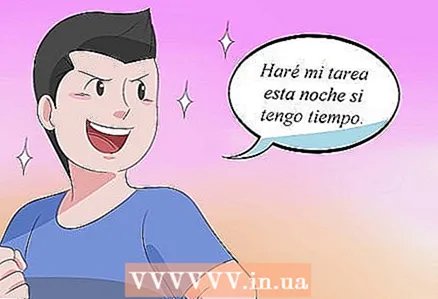 5 Conjugation of the verb hacer in the conditional mood (Condicional de Indicativo). This time should be used when you are describing an action that will definitely be done in the future, provided another circumstance is fulfilled.
5 Conjugation of the verb hacer in the conditional mood (Condicional de Indicativo). This time should be used when you are describing an action that will definitely be done in the future, provided another circumstance is fulfilled. - Example: "Haré mi tarea esta noche si tengo tiempo." "I'll do my homework tonight if I have time."
- yo: haré
- tú: harás
- él / ella / usted: hará
- nosotros / -as: haremos
- vosotros / -as: haréis
- ellos / ellas / ustedes: hará
Method 2 of 5: Subjuntivo
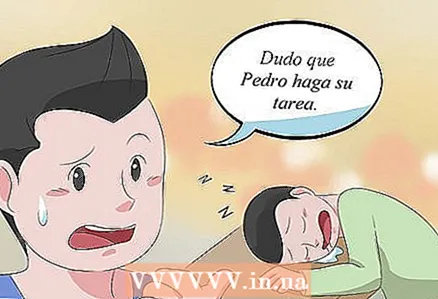 1 Conjugation of the verb hacer in the present tense of the subjunctive mood (Presente Subjuntivo). The present tense of the subjunctive should be used if you are talking about present or current actions when you doubt that they will be done.
1 Conjugation of the verb hacer in the present tense of the subjunctive mood (Presente Subjuntivo). The present tense of the subjunctive should be used if you are talking about present or current actions when you doubt that they will be done. - Example: “Dudo que Pedro haga su tarea.” "I doubt Pedro will do his homework."
- yo: haga
- tú: hagas
- él / ella / usted: haga
- nosotros / -as: hagamos
- vosotros / -as: hagáis
- ellos / ellas / ustedes: hagan
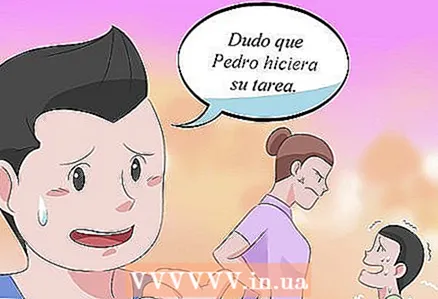 2 Conjugation of the verb hacer in the past tense of the subjunctive (Imperfecto de Subjuntivo). Used to describe actions in the past when you doubt that they have been performed.
2 Conjugation of the verb hacer in the past tense of the subjunctive (Imperfecto de Subjuntivo). Used to describe actions in the past when you doubt that they have been performed. - Please note that for all six persons of the Imperfecto de Subjuntivo tense there are 2 ways of conjugating the verb.
- Example: "Dudo que Pedro hiciera su tarea." "I doubt Pedro did his homework."
- yo: hiciera or hiciese
- tú: hicieras or hicieses
- él / ella / usted: hiciera or hiciese
- nosotros / -as: hiciéramos or hiciésemos
- vosotros / -as: hicierais or hicieseis
- ellos / ellas / ustedes: hicieran or hicisen
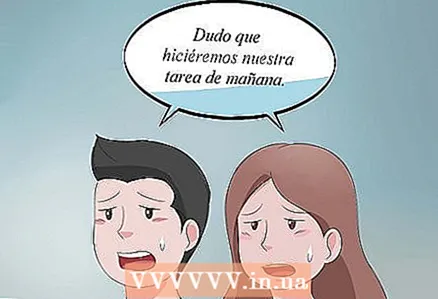 3 Conjugation of the verb hacer in the future tense of the subjunctive (Futuro de Subjuntivo). Used for cases when it is necessary to describe an action that may or may not be done in the future, if you have any doubts about it.
3 Conjugation of the verb hacer in the future tense of the subjunctive (Futuro de Subjuntivo). Used for cases when it is necessary to describe an action that may or may not be done in the future, if you have any doubts about it. - Example: “Dudo que hiciéremos nuestra tarea de mañana.” "I doubt we'll be doing our homework."
- yo: hiciere
- tú: hicieres
- él / ella / usted: hiciere
- nosotros / -as: hiciéremos
- vosotros / -as: hiciereis
- ellos / ellas / ustedes: hicieren
Method 3 of 5: Imperativo Afirmativo
 1 Conjugation of the verb hacer in the imperative mood. Use when you need to give a command or require someone to do something.
1 Conjugation of the verb hacer in the imperative mood. Use when you need to give a command or require someone to do something. - Please note that the verb is not conjugated in the first person singular.
- Example: "Haz tu tarea." "Do your homework!"
- tú: haz
- él / ella / usted: haga
- nosotros / -as: hagamos
- vosotros / -as: haced
- ellos / ellas / ustedes: hagan
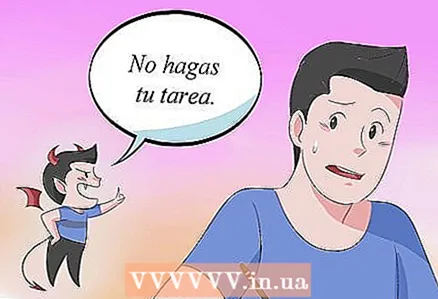 2 Conjugation of the verb in the negative imperative (Imperativo Negativo). Used when you need to give a command or ask someone not to do something.
2 Conjugation of the verb in the negative imperative (Imperativo Negativo). Used when you need to give a command or ask someone not to do something. - Note that there is no first-person singular conjugation here.
- Example: “No hagas tu tarea.” "Don't do your homework."
- tú: no hagas
- él / ella / usted: no haga
- nosotros / -as: no hagamos
- vosotros / -as: no hagáis
- ellos / ellas / ustedes: no hagan
Method 4 of 5: Perfecto
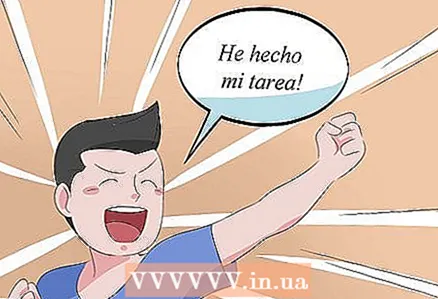 1 Past tense conjugation of hacer (Presente Perfecto). Used to describe an action that has just been completed up to the current moment, without the possibility that the action will be performed again. This form of the verb consists of 2 parts: the conjugated form of the verb haber and the participle of the verb hacer.
1 Past tense conjugation of hacer (Presente Perfecto). Used to describe an action that has just been completed up to the current moment, without the possibility that the action will be performed again. This form of the verb consists of 2 parts: the conjugated form of the verb haber and the participle of the verb hacer. - Example: “He hecho mi tarea.” “I've done my homework.”
- yo: he hecho
- tú: has hecho
- él / ella / usted: ha hecho
- nosotros / -as: hemos hecho
- vosotros / -as: habéis hecho
- ellos / ellas / ustedes: han hecho
 2 Past tense conjugation of hacer (Preterito Perfecto). Used to describe specific completed actions in the past at a specific time.
2 Past tense conjugation of hacer (Preterito Perfecto). Used to describe specific completed actions in the past at a specific time. - This form of the verb consists of two parts of the conjugated part of the verb haber and the singular participle of the verb hacer.
- Example: “Hubisteis hecho vos tarea.” "You've done your homework."
- yo: hube hecho
- tú: hubieste hecho
- él / ella / usted: hubo hecho
- nosotros / -as: hubimos hecho
- vosotros / -as: hubisteis hecho
- ellos / ellas / ustedes: hubieron hecho
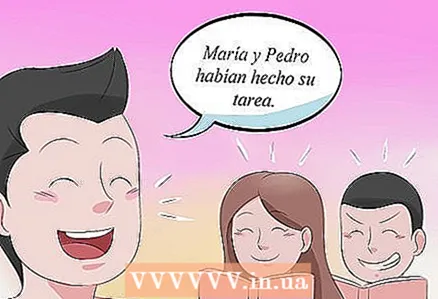 3 Conjugation of the verb hacer in the preliminary indicative tense (Preterito Pluscuamperfecto de Indicativo). This time is used to describe a completed action in the past, preceding another action or fact in the past.
3 Conjugation of the verb hacer in the preliminary indicative tense (Preterito Pluscuamperfecto de Indicativo). This time is used to describe a completed action in the past, preceding another action or fact in the past. - This form of the verb has two parts: the conjugated part of the verb haber and the singular participle of the verb hacer.
- Example: "María y Pedro habían hecho su tarea." “Maria and Pedro were doing their homework”
- yo: había hecho
- tú: habías hecho
- él / ella / usted: había hecho
- nosotros / -as: habíamos hecho
- vosotros / -as: habíais hecho
- ellos / ellas / ustedes: habían hecho
 4 Conjugation of hacer in conditional perfect. Condicional Perfecto tense is used when you need to describe actions that could be taken if certain conditions were met.
4 Conjugation of hacer in conditional perfect. Condicional Perfecto tense is used when you need to describe actions that could be taken if certain conditions were met. - This form consists of 2 parts: the conjugated part of the verb haber and the singular participle of the verb hacer.
- Example: “Habríamos hecho nos tarea si teníamos tiempo.” “We could do our homework if we had time.”
- yo: habría hecho
- tú: habrías hecho
- él / ella / usted: habría hecho
- nosotros / -as: habríamos hecho
- vosotros / -as: habríais hecho
- ellos / ellas / ustedes: habrían hecho
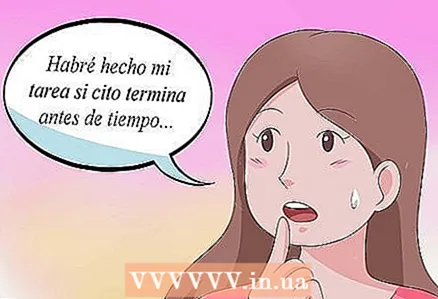 5 Future tense conjugation of hacer (Futuro Perfecto). Used to describe the situation to be done. This form of the verb consists of the conjugated part of the verb haber and the singular participle of the verb hacer.
5 Future tense conjugation of hacer (Futuro Perfecto). Used to describe the situation to be done. This form of the verb consists of the conjugated part of the verb haber and the singular participle of the verb hacer. - Example: “Habré hecho mi tarea si cito termina antes de tiempo.” "I'll do my homework if my meeting ends earlier."
- yo: habré hecho
- tú: habrás hecho
- él / ella / usted: habrá hecho
- nosotros / -as: habremos hecho
- vosotros / -as: habréis hecho
- ellos / ellas / ustedes: habrán hecho
Method 5 of 5: Completed Subjunctive Tense (Perfecto de Subjuntivo)
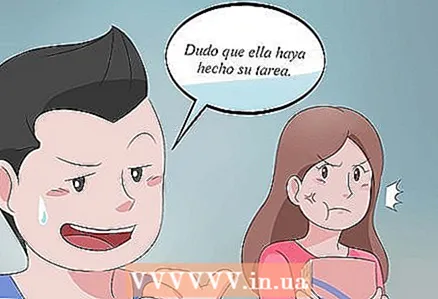 1 Conjugation of the verb hacer in the past completed subjunctive tense. Used to describe actions you are in doubt about at an unspecified point in time in the past.
1 Conjugation of the verb hacer in the past completed subjunctive tense. Used to describe actions you are in doubt about at an unspecified point in time in the past. - This form of the verb consists of 2 parts: the conjugated form of the verb haber and the singular participle of the verb hacer.
- Example: "Dudo que ella haya hecho su tarea." "I doubt she did her homework."
- yo: haya hecho
- tú: hayashecho
- él / ella / usted: haya hecho
- nosotros / -as: hayamos hecho
- vosotros / -as: hayáis hecho
- ellos / ellas / ustedes: hayan hecho
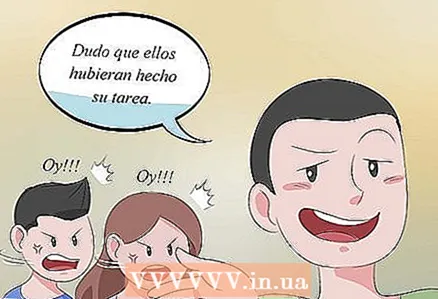 2 Conjugation of the verb in the past completed tense of the subjunctive mood (Pasado Perfecto de Subjuntivo). The past completed subjunctive tense is used to describe an action in case you doubt that it was done at a given moment in the past.
2 Conjugation of the verb in the past completed tense of the subjunctive mood (Pasado Perfecto de Subjuntivo). The past completed subjunctive tense is used to describe an action in case you doubt that it was done at a given moment in the past. - This form consists of 2 parts: the conjugated part of the verb haber and the singular participle of the verb hacer.
- Example: “Dudo que ellos hubieran hecho su tarea.” "I doubt they would have done their homework."
- yo: hubiera hecho
- tú: hubieras hecho
- él / ella / usted: hubiera hecho
- nosotros / -as: hubiéramos hecho
- vosotros / -as: hubierais hecho
- ellos / ellas / ustedes: hubieran hecho
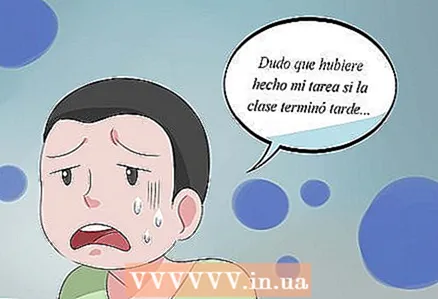 3 Conjugation of the verb hacer in the future completed subjunctive tense (Futuro Perfecto de Subjuntivo). Used to describe future actions in case you doubt they can be done.
3 Conjugation of the verb hacer in the future completed subjunctive tense (Futuro Perfecto de Subjuntivo). Used to describe future actions in case you doubt they can be done. - This form consists of 2 parts: the conjugated part of the verb haber and the singular participle of the verb hacer.
- Example: "Dudo que hubiere hecho mi tarea si la clase terminó tarde." “I doubt I can do my homework if the class ends late.”
- yo: hubiere hecho
- tú: hubieres hecho
- él / ella / usted: hubiere hecho
- nosotros / -as: hubiéremos hecho
- vosotros / -as: hubiereis hecho
- ellos / ellas / ustedes: hubieren hecho
